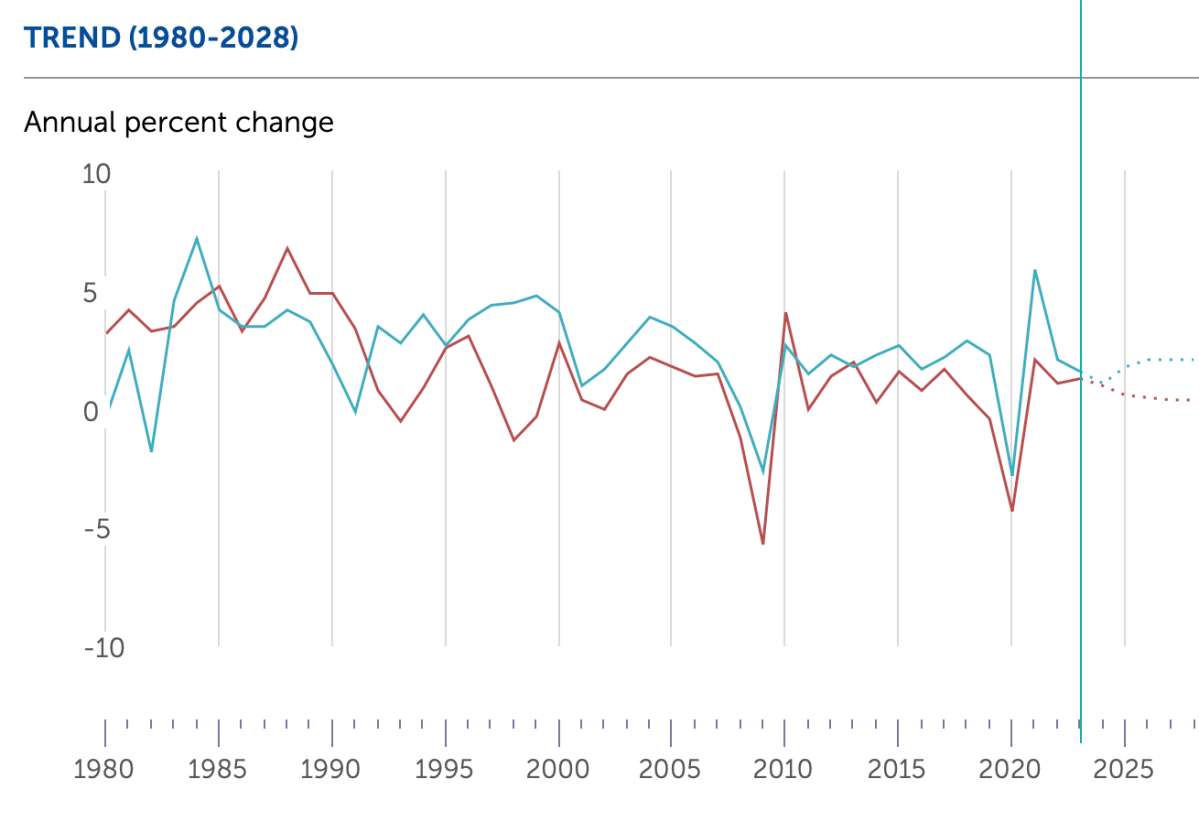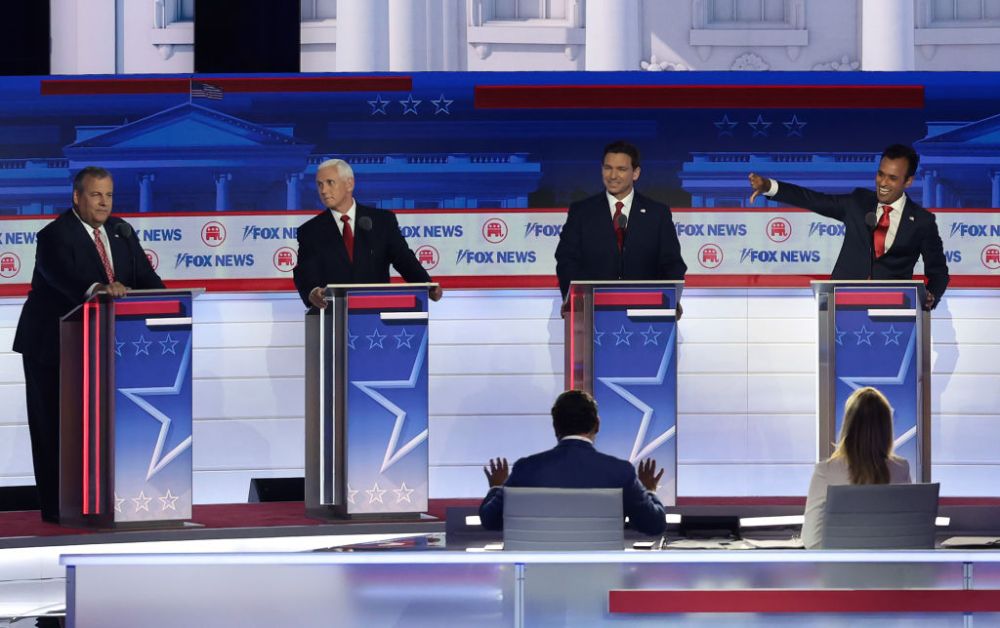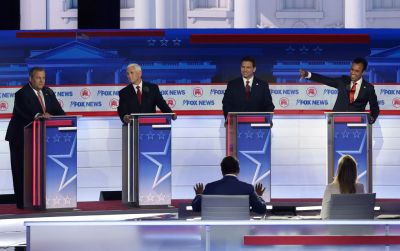If the Republicans on the Milwaukee debate stage seemed incoherent to you, it is because the Republicans on the Milwaukee debate stage were incoherent. Incoherence is one of the many unhappy side effects a party experiences when it abandons its values.
Take national security. For more than a half a century, the Republicans were the party associated with a more robust—and more serious—program for national security. Now, they are and they aren’t, and they mostly aren’t. Ron DeSantis, the Florida governor and miraculously disappearing Trump challenger, has complained that the Biden administration is too eager to help Ukraine and our European allies repel the Russian invasion that launched the most significant war in Europe since World War II. We have critical defense interests, DeSantis told Tucker Carlson in March, and “becoming further entangled in a territorial dispute between Ukraine and Russia is not one of them.” He protests that the U.S. government is offering Kyiv a “blank check.”
DeSantis has reconnected with an ancient stream of Republican isolationism that flares up from time to time, as in Bob Dole’s infamous denunciation of “Democrat wars” in his 1976 vice presidential debate with Walter Mondale. The weird thing is, DeSantis also vowed to invade Mexico on his first day—literally: “I will do it on Day 1,” he pledged at the debate in response to a question about the drug cartels operating in the country. A few bucks to push back Moscow is a bridge too far, but an illegal and unprovoked invasion of our peaceable neighbor to the south is, somehow, obviously the right thing to do.
DeSantis’ planned military operation in Mexico would consist of sending special forces to target drug cartels—inevitably over the protests of the Mexican government. That is a drug policy of a sort—but it is also an act of war, literalizing the previously metaphorical war on drugs. DeSantis also has vowed to impose a policy of summary execution on drug smugglers—something that a president has no constitutional power to do. “If you have somebody coming in with fentanyl in the backpack,” he said last month, “that’s the last thing they’re going to be able to do, because we’re going to leave them stone-cold dead at the border.” That would be a crime, and the order to commit that crime would be an illegal order—something DeSantis very well knows, having served as a lawyer in the Judge Advocate General’s Corps in the Navy Reserve.
(DeSantis did not serve with the SEALs, though you might have gotten the impression during the debate that he had from his repeated references to working alongside SEALs.)
When you have no values or ideas to guide your policies, it’s easy to slip into cheap substitutes. In DeSantis’ case, the substitute is brutality, or at least the threat of brutality. So, it’s kid gloves for Vladimir Putin, because Tucker Carlson and six guys on Twitter say so, and outright murder at the border. Now that’s incoherence.
Another cheap substitute for the values and the hard thinking that can guide you through a difficult policy question is pretending that every question is an easy one with an obvious answer. That’s the Vivek Ramaswamy approach.
Ramaswamy says he is “somebody who actually celebrates birthright citizenship as a major American accomplishment.” That’s nice. But his proposed policy calls for ending birthright citizenship, something no president—or Congress—actually has the power to do. It would require a constitutional amendment, a proposal that would be unlikely to achieve ratification. Ramaswamy also demands we get federal spending under control while at the same proposing the construction of a massive new federal mental-health infrastructure. He is an America Firster who argues that Americans should model their politics on those of India’s Hindu-nationalist Bharatiya Janata Party.
A little odd, all that.
How to resolve those contradictions? Smirk and declare: “This isn’t complicated.”
Which is the kind of thing you say right before declaring, as Ramaswamy did, that we won the Revolutionary War thanks to the blessings of the Constitution, which hadn’t been written until years after the revolution and the failure of the Articles of Confederation.
And so it goes: Mike Pence has said Donald Trump put himself over the Constitution and “should never be president again”—and then affirmed at the debate that he’d vote for Trump if he were the nominee, even if he were convicted of a felony before the election. Two of the most vocal critics of Trump on the debate stage were Chris Christie—chairman of Trump’s transition team before being demoted to vice chairman—and Nikki Haley, one of the Trump administration’s top diplomats as ambassador to the United Nations. The joke in Washington is that nobody thinks less of Trump than the people who worked for him, but neither of these Republican presidential hopefuls has actually taken stock of his or her role—and culpability—in the misdeeds and misgovernance of the Trump years. They act like everything was hunky-dory until January 6, 2021. But it wasn’t.
The Trump administration was entirely bereft of values and ideas—it simply lurched from crisis to crisis, driven by the vanity of one small man and the opportunism of a few dozen even smaller men and women. In the course of its four years in power, the Trump administration helped to remake the Republican Party in its own image: rage-addled, shortsighted, intellectually lazy, arrogant, and, above all, incoherent.
And so the party of “family values” was transformed into the party of no values at all.
Economics for English Majors
Some additional thoughts on Paul Krugman’s New York Times column about Joe Biden’s trade protectionism (Krugman: “Hooray!”) vs. Donald Trump’s trade protectionism (Krugman: “The horror!”) that I didn’t get to last week. Professor Krugman writes:
A tariff would, of course, be a tax—a tax that would, whatever Trump may assert, fall on U.S. families, probably disproportionately hitting lower-income households. It would also push consumers into buying higher-cost, lower-quality goods, because that’s what protectionism does, making America as a whole poorer.
One of the things that is worth noting here is that this is a version of the Chinese Communist Party’s economic strategy for many years: artificially lowering the overall standard of living for the Chinese people as a whole in order to subsidize politically sensitive—and politically connected—domestic manufacturing businesses, particularly export-oriented ones or ones that are particularly vulnerable to competition from overseas firms. Before that was Chinese policy, it was Japanese policy—in the postwar decades, the Japanese government encouraged and subsidized exports to a remarkable extent, including by treating all export income as tax-free—a big incentive indeed in a country that in the 1960s had a top corporate tax rate of 52.8 percent.
Donald Trump was quite fixated on the specter of Japanese economic supremacy in the 1980s, when he first really started talking publicly about political issues, and he sometimes still speaks as though Japan were riding high, even though the country has in effect been in something close to a generation-long recession. In the late 1980s, Japan was the country that was going to eat our lunch; in the early 1990s, it entered into the “lost decades”: 20 years of economic stagnation and decline. Its nominal GDP in 2007 was just shy of $1 trillion a year less than it had been in 1995. Japan has not exactly boomed in the subsequent years, either. The country has a very productive, high-tech, trade-oriented economy, but it also has a declining population, very high public debt, and other significant headwinds. For science fiction writers in the late Cold War years, the future was Japanese—think of that skyscraper-sized geisha advertisement in Blade Runner or the cyber-yakuza in Johnny Mnemonic.
That didn’t happen. Japan didn’t fall apart, but it didn’t take off like a rocket, either. Here’s Japan’s economic growth (in red) compared to the United States’ growth (in blue).

Japan was an earlier generation’s Asian Economic Superman, and then it was China that was going to “eat our lunch.” (That phrase recurs: You’d think a nation as well-fed as ours would be less defensive about its lunch.) China’s lunch-eating strategy was one of protectionism and export subsidy. And it left the Chinese people as a whole worse off than they otherwise could have been just to protect politically connected firms from competitors offering better products or better prices. The whole point of protectionism is to keep better goods and better prices out of the marketplace, serving the interests of a lucky few at the expense of the many. What’s strange is that so many people in the West fool themselves into thinking that this is a smart long-term strategy. But Japan is economically stagnant, and China is on the cusp of a genuine economic crisis—which, in China, means a political crisis, too.
The myth of the Asian Economic Superman is partly the result of pessimism bias, partly the result of economic illiteracy and short-termism (as with the forced industrialization of the Soviet Union, the transformation of an agrarian society into an industrial one or the rapid rebuilding of a war-wrecked economy can produce remarkable growth—once, and for a limited time), and, I think, at least partly the result of hard-to-shed racial stereotypes. The idea that the Far East is teeming with endless hordes of hungry, desperate, sweaty people willing to work for pennies a day is deeply entrenched in the American mind. You can almost hear the White House economic advisers saying: “Charlie didn’t get much USO. He was dug in too deep or moving too fast. His idea of great R&R was cold rice and a little rat meat.” First it was Japan, then it was China, and India auditioned for the role, but India isn’t a behemoth exporter of highly visible consumer goods like Japan was back in the day (“bloody good cameras”) and China is today, so that didn’t quite fly. My guess is it’ll be South Korea next—for American “economic nationalists,” there’s no enemy quite like an ally.
But the Asian Economic Superman provides a useful service: He allows Americans to pretend that the source of our economic disappointments is nefarious machinations in Tokyo, or Beijing, or New Delhi, or—angels and ministers of grace, defend us!—Ottawa, those scheming Canadians and their plague of ... much-needed affordable lumber out of which we might, if we were smart, build some much-needed affordable housing.
The world is complex and full of dangers. But the real U.S. economic-policy problem is, and always has been, made in Washington.
Words About Words
While in office, Donald Trump played more golf than any modern president, and the stories about him cheating at the sport are rampant. There’s an entire book devoted to his alleged flaunting of the game’s rules. Despite his reputation, Trump insists on claiming he regularly wins tournaments, but suspiciously only at his own courses.
Donald Trump does not flaunt the rules of golf—that is a vicious lie.
He flouts the rules of golf—just as he flouts good taste, common decency, the Constitution, etc.
To flaunt something is to show it off: A rich man might flaunt his wealth, a beautiful woman might flaunt her beauty, one of those younger Kardashians I can’t tell apart might very well flaunt both. To flout something is to disregard it: Rolling Stone writers routinely flout English grammar and usage both.
Flaunt/flout are a pair of frequently conflated words. Similar sets are founder (sink or, metaphorically, stagnate) and flounder (to flop about like a fish out of water), and career (rush headlong, go in a generally reckless or crazy fashion) and careen (run into something or bounce off of something).
You know our rule here: Different words for different things.
Elsewhere
You know who hurricanes are good for? Ron DeSantis. More in the New York Post.
You can buy my most recent book, Big White Ghetto, here.
You can buy my other books here.
You can see my New York Post columns here.
In Closing
Nobody likes wall-to-wall carpeting except babies and Pancake.








Please note that we at The Dispatch hold ourselves, our work, and our commenters to a higher standard than other places on the internet. We welcome comments that foster genuine debate or discussion—including comments critical of us or our work—but responses that include ad hominem attacks on fellow Dispatch members or are intended to stoke fear and anger may be moderated.
With your membership, you only have the ability to comment on The Morning Dispatch articles. Consider upgrading to join the conversation everywhere.